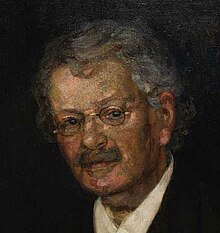Knut Wicksell
Johan Gustav Knut Wicksell (born December 20, 1851 in Stockholm , † May 3, 1926 in Stocksund , Danderyd ) was a Swedish economist . The Wicksell process , which describes the interdependencies between interest rate policy and the economy , is named after him . With his approach he shaped the Swedish School of Economics .
Life
Knut Wicksell was born in 1851, the youngest of five children of a grocer in Stockholm. At the age of 13 he went to high school, where he joined a group of free thinkers who wrote poetry in a literary circle against the establishment. After passing the final exam, Wicksell began to study Latin, Scandinavian languages, mathematics, astronomy, history and philosophy at Uppsala University in 1872 (although with this abundance of faculties one must bear in mind that the courses were not as specialized then as they are today is). During this time Wicksell became an avowed atheist.
In 1885 Wicksell went to London, where he read the classical English economists (especially Smith , Ricardo , Mill and Bentham ). At the age of 50 he became a professor at Lund University . After his retirement in 1916, he returned to Stockholm, where he advised the Bank of Sweden based there. In May 1926, Wicksell died of pneumonia in Stocksund at the age of 75.
Act
In his main work, Geldzins und Güterpreise (1898), Wicksell systematically examined the relationship between the amount of money , interest rates and price levels . In Wicksell's view, inflation and deflation are equally damaging, which is why he raised the question of how price level stability can be achieved.
To this end, he differentiated for the first time between market interest rates and natural interest rates and defined the latter as "that rate of loan interest at which this is quite neutral in relation to the prices of goods and has no tendency to either increase or decrease". In other words, price stability exists when the market interest rate coincides with the natural interest rate. If the market interest rate falls below the natural interest rate, there is a tendency to inflation, in the opposite case to deflation ( Wicksell process ). Wicksell saw it as the job of the ( central bank ) to find the right balance between these two rates. With his business cycle theory considerations, Wicksell became the father of overinvestment theory .
The Wicksell process
The Wicksell process describes the influence of monetary policy on investment and savings behavior as well as the economy as follows: The lowering of the key interest rate below the natural rate initially results in less savings and more consumption - overall economic demand increases. For entrepreneurs, this increases the incentive to invest, and consequently the demand for credit increases. After all, the demand for credit is so great that it cannot be completely outweighed by the capital supply of savers, but also by newly circulated money as a result of the excessively loose monetary policy. There is an increased demand for capital goods, while at the same time the capital market is showing itself to be unproductive. The ineligibility is offset by credit creation . So every rate cut triggers credit creation, investment and increased consumption. The investments lead to higher wage and salary payments and also increase consumption. The result is a price increase on the goods market. Conversely, if the key interest rate is artificially inflated, there is an unlimited drop in demand and prices (Wicksell downward process). With this, Wicksell points out: In the event of exaggerations, the rate hike can calm them down, and in the event of economic downturn, the rate cut can increase activity.
Works (selection)
- Financial theoretical investigations. In addition to presentation and criticism of the tax system in Sweden. 1896
- Interest in money and prices of goods. 1898
- Money and credit . 1922 ( lectures on economics based on the marginal principle / vol. 2. )
Individual evidence
- ↑ a b Short 'biography' of Prof. Dr. Harald Hagemann - University of Hohenheim. ( PDF ( Memento of the original from January 30, 2012 in the Internet Archive ) Info: The archive link has been inserted automatically and has not yet been checked. Please check the original and archive link according to the instructions and then remove this note .; 13 kB)
- ^ Paul Strathern. A Brief History of Economic Genius . Thomson Texere, New York, 2001 ISBN 1-58799-189-6 pp. 229f.
-
^ Hans Gestrich: Credit and saving. Jena 1944. (1st edition) p. 98:
“... the situation arises in which more is saved than given credit. If the credit policy does not intervene, by lowering the interest rate, it stimulates the use of credit for investments, then the WICKSELLian downward process begins . " - ^ Heinrich Rittershausen: banking policy. Frankfurt 1956. pp. 195-196.
Web links
- Literature by and about Knut Wicksell in the catalog of the German National Library
- Wicksell In: Die Zeit , No. 31/1999, in the Zeit-Bibliothek der Ökonomie (11)
| personal data | |
|---|---|
| SURNAME | Wicksell, Knut |
| ALTERNATIVE NAMES | Wicksell, Johan Gustav Knut (full name) |
| BRIEF DESCRIPTION | Swedish economist |
| DATE OF BIRTH | December 20, 1851 |
| PLACE OF BIRTH | Stockholm |
| DATE OF DEATH | May 3, 1926 |
| Place of death | Stocksund , Danderyd |

